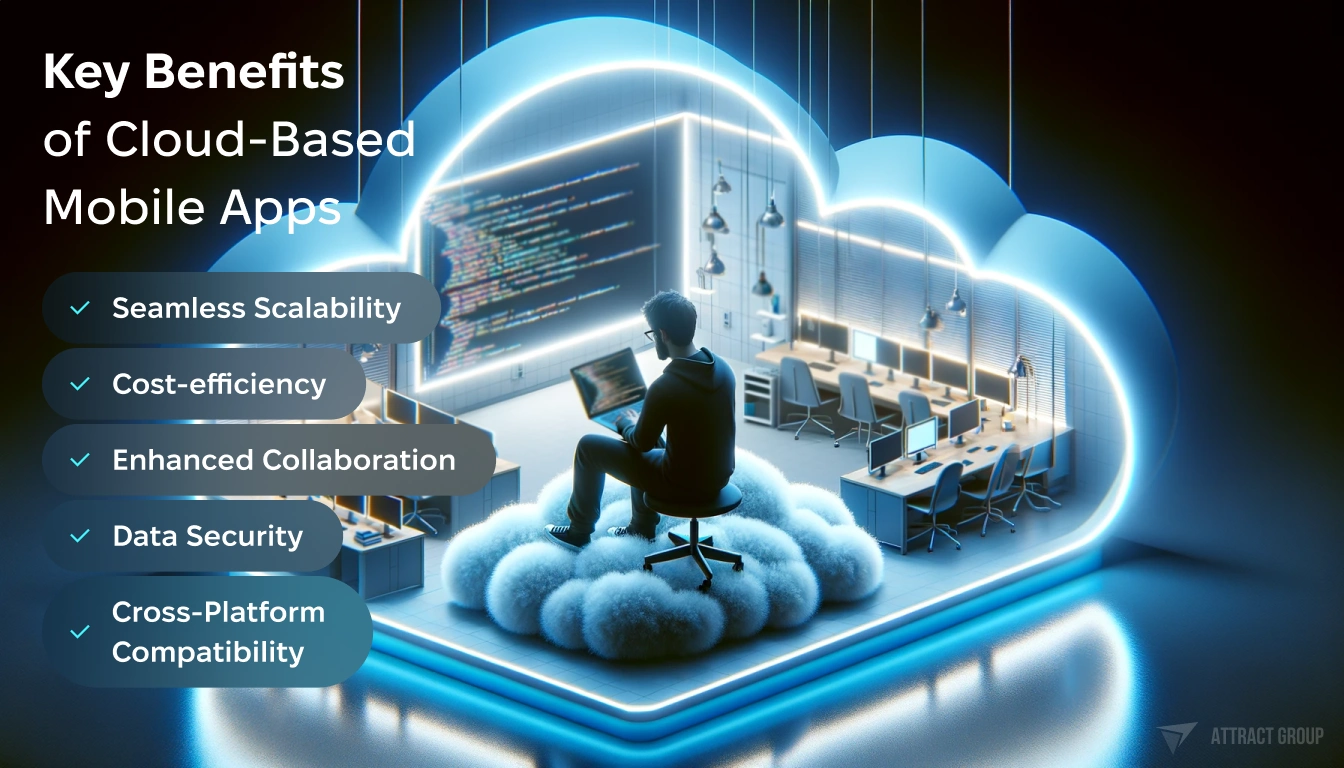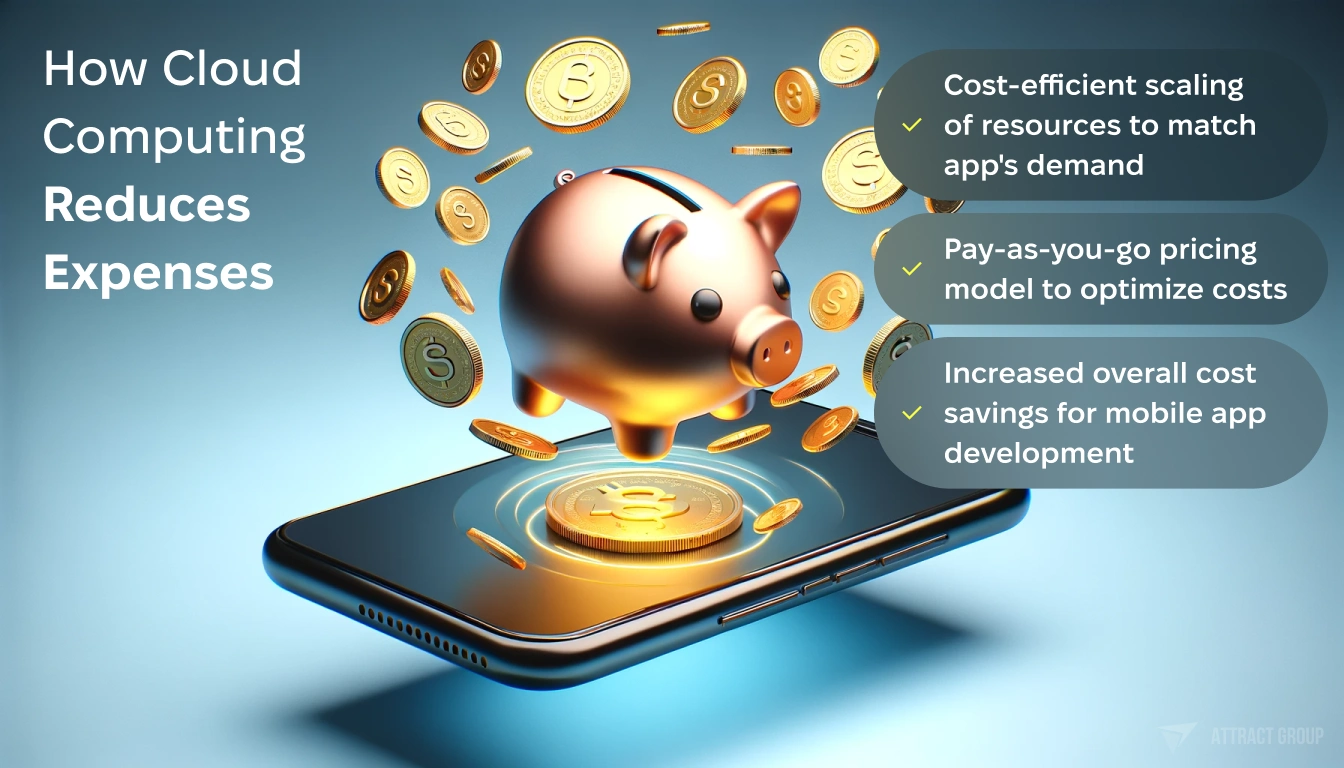Cloud computing has rapidly emerged as the foundational framework for contemporary mobile app development, providing a wealth of resources like servers, storage, databases, and software, easily accessible over the internet. This powerful infrastructure is integral to innovating and developing cutting-edge applications, as it presents numerous advantages, including scalability, reduced operational costs, and improved collaboration. As a result, cloud-based mobile app development has quickly gained prominence in the realm of technological advancement.
As the world becomes increasingly reliant on mobile devices and the applications that fuel them, harnessing the power of cloud computing for mobile app development is imperative for businesses looking to stay competitive in today’s digital landscape.
Key Takeaways
- Cloud computing serves as the backbone for modern mobile app development, offering essential resources over the internet.
- Cloud-powered mobile apps benefit from scalability, cost-efficiency, and enhanced collaboration.
- Cloud-based mobile app development has become an integral aspect of technological progress.
- Cloud computing platforms, such as Google Cloud, AWS, and Azure, offer distinct services suited for different mobile application needs.
- Secure cloud storage solutions and mobile cloud computing contribute to seamless and efficient app development processes.
The Evolution of Mobile App Development with Cloud Computing
Over the years, the Evolution of Mobile App Development has seen significant changes, with cloud computing playing a crucial role in the transformation. Once limited to local reach, mobile app development has now expanded to a global scale due to the integration with cloud services. The fusion of mobile app development and cloud computing has revolutionized the way developers build, deploy, and manage applications.
From Local to Global: The Transition to Cloud Mobile App Development
Switching from local development to a Mobile App Development Cloud environment opened up new possibilities for developers. The realm of cloud-based app development now extends to enterprises and budding innovators alike, enabling rapid development and deployment of mobile applications around the globe. This Global Mobile App Development shift transformed the industry by granting access to unlimited resources, improved collaboration, and reduced production costs.
The integration of cloud computing into mobile app development has revolutionized the way developers build, deploy, and manage applications
The Synergy of Mobile Apps and Cloud Services
The collaboration between mobile apps and cloud services has given rise to a symbiotic relationship where the cloud supports Mobile App Development and mobile apps benefit from Cloud Services for Mobile Apps. This synergy enhances the capabilities of mobile applications since they harness the power of cloud storage solutions and APIs to unlock new features and additional functionality. Furthermore, this powerful blend utilizes a Cloud Mobile App Development Platform that enables real-time updates and seamless synchronization across all devices.
| Cloud Services | Mobile App Features | Benefits |
|---|---|---|
| Data Storage | Secure storage and retrieval of user data | Streamlined data management |
| APIs | Integration with other services and functionalities | Reduced development complexity and time |
| Scalability | Flexible resource allocation to meet user demands | Cost-effectiveness and performance optimization |
Thus, the adoption of cloud computing in mobile app development signifies a groundbreaking evolution within the industry, redefining how applications are built and deployed on a global scale. The comprehensive and robust features provided by cloud services empower mobile apps to reach new heights while offering unparalleled user experiences.
Key Benefits of Cloud-Based Mobile Apps
Cloud-based mobile apps have significantly transformed the way businesses operate and developers create applications. There are several key benefits that drive the adoption of cloud-based mobile app development. These advantages underscore the importance of mobile cloud computing in today’s technology landscape.

The following are some of the main benefits of cloud-based mobile apps:
- Seamless Scalability: Cloud infrastructure allows mobile apps to scale up or down with ease, depending on user demand, ensuring consistent performance and a positive user experience.
- Cost-efficiency: Adopting cloud-based mobile apps eliminates the need for upfront investment in hardware and infrastructure, reducing operational costs for businesses.
- Enhanced Collaboration: Cloud computing enables real-time collaboration among development teams, streamlining the development process and fostering innovation.
- Data Security: Cloud platforms offer robust data security features, such as data encryption and access control measures, ensuring sensitive information is protected.
- Cross-Platform Compatibility: Cloud-based mobile apps can be developed to work across multiple platforms (iOS, Android, etc.) with minimal effort, widening their reach and potential user base.
“Cloud-based mobile apps offer significant benefits such as seamless scalability, cost-efficiency for businesses, and enhanced collaborative capabilities”
These benefits are only a fraction of the myriad advantages that cloud-based mobile apps present. To fully grasp the positive impact of mobile cloud computing, it is essential to delve deeper into various aspects of cloud-based mobile app development and the cloud platforms that support it.
| Benefit | Explanation |
|---|---|
| Seamless Scalability | Cloud infrastructure allows mobile apps to effortlessly adjust their resource consumption levels based on user demand, maintaining consistent performance and positive user experience. |
| Cost-efficiency | Cloud-based mobile apps reduce operational costs by eliminating the need for upfront investment in hardware and infrastructure, making them more affordable for businesses of all sizes. |
| Enhanced Collaboration | Real-time collaboration among development teams is facilitated through the use of cloud computing platforms, streamlining the development process and fostering innovation. |
| Data Security | Cloud platforms provide robust data security features such as data encryption and access control measures, ensuring sensitive information within the mobile app is protected. |
| Cross-Platform Compatibility | Mobile apps developed on cloud platforms can be designed to work across multiple operating systems with minimal effort, expanding their reach and potential user base. |
As technology continues to advance, cloud-based mobile app development will become even more critical, providing businesses with a comprehensive range of benefits and opportunities for innovation.
Understanding Cloud Computing Platforms for Mobile Development
When it comes to mobile app development, selecting the right cloud computing platform is essential for optimizing performance, cost, and functionality. Google Cloud Mobile App Development, AWS Mobile Development, and Azure Mobile App are some of the leading cloud computing platforms for mobile development. Each platform offers a unique set of services, pricing models, and performance capabilities, making it crucial for developers to carefully weigh their specific project requirements and goals before making a decision.
Choosing Between Google Cloud, AWS, and Azure for Your Mobile App
Google Cloud Platform (GCP), Amazon Web Services (AWS), and Microsoft Azure are the top three Cloud Computing Platforms for Mobile Development. They all provide a similar set of core services, including compute, storage, databases, and networking. However, the choice between these platforms is often based on factors like:
- Pricing and cost-effectiveness
- Available services and features
- Scalability and performance
- Developer community and support
- Integration with existing tools and technologies

Comparing these factors can help developers make a well-informed decision when selecting the right cloud computing platform for their mobile app.
| Platform | Pricing Model | Key Features | Notable Services |
|---|---|---|---|
| Google Cloud | Pay-as-you-go | Powerful data analytics and AI services, extensive global infrastructure, developer-friendly environment | App Engine, Cloud SQL, Firebase, Cloud Functions |
| AWS | Pay-as-you-go, Reserved Instances, Savings Plans | Extensive service offerings, global reach, strong security features, an established presence in the market | EC2, Lambda, S3, Amazon RDS, Amplify |
| Azure | Pay-as-you-go, Reserved Instances | Deep integration with Microsoft tools, popular choice for enterprise clients, hybrid cloud solutions | App Service, Azure SQL Database, Azure Functions, Cosmos DB |
Mobile Backend as a Service (MBaaS): A Developer’s Shortcut
In addition to the cloud computing platforms, developers can also consider using Mobile Backend as a Service (MBaaS) solutions to accelerate the development process. MBaaS provides pre-built, serverless infrastructure that simplifies backend development, allowing developers to focus on building robust and high-performing mobile applications. Some notable features of MBaaS include:
- User authentication and management
- Data storage and retrieval
- Push notifications and messaging
- Backend business logic
- Integration with third-party services and APIs
Utilizing MBaaS can be a significant developer shortcut in cloud computing, providing immense value for mobile app developers striving to expedite the development process without compromising on the application’s quality or performance.
Building Scalable Mobile Apps on the Cloud
Scalable mobile apps on the cloud have become an essential component in providing a consistent and seamless experience for users. The cloud infrastructure has enabled developers to build scalable mobile apps that can adapt to fluctuating user demands. Cloud-based mobile app development ensures optimized performance and top-notch user experience by utilizing resources dynamically to adapt to changes in load or traffic.

Scalable cloud mobile apps can effortlessly expand from a small user base to support millions of users. The advantages of building scalable mobile apps on cloud infrastructure are numerous, and some of the considerable benefits include:
- Virtually unlimited computing and storage resources
- Automatic scaling based on changing traffic and workload patterns
- Faster time-to-market for app deployments
- Cost optimization via pay-as-you-go pricing models
“Scalable mobile apps are vital in meeting the growing needs of users and businesses.”
One crucial factor for building scalable mobile apps is the selection of a suitable cloud platform, such as Google Cloud Platform, Amazon Web Services (AWS), or Microsoft Azure. These cloud service providers offer tools and technologies to help optimize app scaling and performance across various devices and networks globally.
When building a scalable mobile app on the cloud, developers should take into account:
- The architecture design, ensuring it can accommodate fluctuations in user demand
- Use of stateless components to reduce limitations and dependencies between components
- Monitoring and performance management to ensure the app runs smoothly
- Security features, as scalability demands robust security to protect user data and maintain user trust
| Cloud Platform | Scalable Mobile App Features |
|---|---|
| Google Cloud Platform | Automatic scaling, App Engine, Cloud Firestore, Cloud Functions |
| Amazon Web Services (AWS) | Auto-scaling groups, AWS Lambda, Amazon Simple Notification Service (SNS) |
| Microsoft Azure | Azure Functions, Azure Table Storage, Azure Event Grid |
Building scalable mobile apps on the cloud ensures businesses can efficiently deliver their offerings to users on a global scale, catering to any fluctuations in demand. Leveraging the cloud infrastructure empowers developers to optimize performance and provide a superior user experience. As businesses and user demands continue to evolve, scalable cloud mobile apps will serve as a critical foundation for sustainable growth and success.
Our expert developers leverage cloud computing to build scalable, high-performance mobile apps tailored to your business needs
Integrating Cloud Services for Enhanced Mobile App Functionality
The integration of cloud services is pivotal in enhancing mobile app functionality. This approach allows developers to harness the power of cloud storage solutions to simplify app data management and leverage cloud-based APIs for extending mobile app capabilities.
Cloud Storage Solutions for App Data Management
Cloud storage solutions provide developers with secure, scalable, and cost-effective ways to manage data within mobile apps. By utilizing cloud-based services for storing and retrieving user data, developers can streamline the app data management process, ultimately improving the app’s performance and user experience.

Simplifying the storage and retrieval of user data is key to optimizing the performance of mobile apps without overwhelming resources or compromising user privacy.
Some leading cloud storage solutions for mobile app development are:
- Amazon Simple Storage Service (S3)
- Google Cloud Storage
- Microsoft Azure Blob Storage
- Firebase Storage (for real-time data synchronization)
Utilizing Cloud-Based APIs for Extended Mobile App Capabilities
Cloud-based APIs enable mobile app developers to extend app functionalities by streamlining integration with other services and platforms. They improve the efficiency of mobile apps and reduce the overall development time and complexity, providing an optimal experience for end-users.
Some popular cloud-based APIs for enhancing mobile app capabilities include:
- Google Maps API for location-based services
- Amazon Web Services API for accessing various AWS services
- Microsoft Azure Cognitive Services API for AI-powered features
- Twilio API for communication and messaging services
| Cloud-Based API | Features Offered |
|---|---|
| Google Maps API | Geolocation, navigation, and mapping services |
| Amazon Web Services API | Serverless computing, storage, databases, and more |
| Microsoft Azure Cognitive Services API | Language understanding, computer vision, speech recognition |
| Twilio API | SMS, voice, video, and chat functionality |
In conclusion, integrating cloud services into mobile app development significantly enhances the app functionality by simplifying app data management through cloud storage solutions and leveraging cloud-based APIs for extended capabilities. By harnessing the power of cloud services, developers can deliver innovative mobile apps that cater to the dynamic demands of today’s sophisticated users.
Cost-Effective Development: How Cloud Computing Reduces Expenses
Cloud computing revolutionizes the mobile app development landscape by significantly reducing costs and fostering cost-effective app development. This technology minimizes expenses in three key ways: cutting the need for initial infrastructure investment, providing scalable resource consumption, and decreasing maintenance overhead.

One of the most apparent cost savings from adopting cloud computing is the reduction in required upfront investment. Traditionally, developers needed to purchase and maintain physical servers and storage equipment to host applications. With cloud computing, this burden falls on the cloud provider who offers infrastructure as a service, allowing developers to rent only the resources they need without a hefty upfront cost.
“Cloud computing offers a more cost-effective approach to building and deploying mobile apps, without the financial constraints of traditional methods.”
Another considerable expense reduction associated with cloud app development is the scalability of resource consumption. Cloud platforms provide developers with the flexibility to adjust resources based on their app’s current demand. This ensures that developers only pay for the resources they are using, instead of wasting money on idle resources during periods of low traffic.
- Cost-efficient scaling of resources to match app’s demand
- Pay-as-you-go pricing model to optimize costs
- Increased overall cost savings for mobile app development
Lastly, cloud computing decreases maintenance overhead by offloading server management responsibilities to the cloud provider. Developers no longer need to dedicate resources to server upkeep, system patches, or updates, allowing them to focus solely on creating innovative mobile applications.
| Expense Category | Traditional Development | Cloud Computing |
|---|---|---|
| Initial Infrastructure Investment | High | Low |
| Resource Consumption | Fixed | Scalable |
| Maintenance Overhead | High | Low |
In conclusion, cloud computing substantially reduces mobile app development expenses by eliminating the need for large initial investments, offering scalable resources, and minimizing maintenance overhead. This enables developers to build cost-effective mobile apps that can compete in the fast-paced app market without compromising on quality or innovation.
Security Measures in Cloud Mobile App Development
In today’s digital world, security is a fundamental concern for businesses and individuals alike. Implementing robust security measures is crucial when it comes to cloud mobile app development, ensuring the protection of sensitive data and user trust. The following measures are integral to creating secure cloud-powered mobile apps:
Ensuring Data Protection and Compliance in the Cloud

Cloud compliance involves adhering to the set of policies, standards, and regulations governing the protection of data stored in cloud environments. Establishing and maintaining data protection and cloud compliance is an ongoing process, and the following strategies play essential roles in ensuring that the security standards are met:
- Data encryption: Encrypting data both in transit and at rest is a vital measure to safeguard information from unauthorized access. Encryption transforms data into an unreadable format that can only be deciphered when decrypted using the correct key. This ensures that even if a breach occurs, the data is not readily accessible.
- Robust access controls: Implementing strong authentication and authorization mechanisms is critical in controlling access to sensitive data. This includes the use of multi-factor authentication (MFA), role-based access control (RBAC), and the principle of least privilege (PoLP) for granting access to authorized personnel only.
- Regular security audits and monitoring: Conducting regular security audits and continuous monitoring helps identify potential risks and vulnerabilities, ensuring timely action to mitigate any threats.
- Compliance management: Abiding by all the relevant industry-specific compliance standards such as GDPR, HIPAA, and PCI DSS is crucial for any business working with sensitive data. Staying up-to-date with these regulations and ensuring that the app meets the necessary requirements helps avoid legal liabilities and protects user trust.
Our agile development teams utilize the power of the cloud to rapidly build, test, and deploy innovative mobile apps
In addition to the above measures, it is essential to emphasize application security from the early stages of the development lifecycle and adopt a proactive approach to address potential security risks.
“A comprehensive security strategy encompasses data encryption, robust access controls, and compliance adherence to protect sensitive information and maintain user trust.”
Ultimately, maintaining security in cloud mobile app development involves implementing a multi-layered approach encompassing encryption, access controls, and compliance management, ensuring that data is safe and user trust is upheld.
Cloud Infrastructure: Facilitating Seamless Remote Collaboration
Cloud infrastructure has become a cornerstone of remote collaboration, allowing teams to work collectively and efficiently from various locations across the globe. The integration of cloud services in remote work scenarios has been key to enhancing productivity and fostering innovation in mobile app development.

By harnessing the power of cloud computing collaboration platforms, remote teams can access essential resources and tools anytime, anywhere. This fosters a dynamic and flexible environment for designing, developing, and deploying mobile applications.
“Cloud infrastructure underpins remote collaboration, providing teams with the tools and platforms necessary to work efficiently from disparate locations.”
The following highlights the key cloud services that facilitate remote collaboration in mobile app development:
- Cloud storage and databases: Store and manage data effectively, making it accessible for all team members.
- Version control systems: Manage the development process, track changes, and handle collaboration-related challenges such as code merging and conflict resolution.
- Project management tools: Track and monitor the progress of mobile app development projects, ensuring clear communication and coordination among team members.
- Collaboration platforms: Utilize real-time chat features, video conferencing, and file-sharing capabilities to maintain seamless communication and collaboration during the development process.
| Service | Provider | Description |
|---|---|---|
| Cloud storage and databases | Azure, AWS, Google Cloud | Flexible and scalable storage options for data management |
| Version control systems | GitHub, Bitbucket, GitLab | Manage source code, track changes, and facilitate collaboration |
| Project management tools | Trello, Asana, Jira | Organize tasks, timelines, and collaboration for efficient development |
| Collaboration platforms | Slack, Microsoft Teams, Zoom | Enable communication, file-sharing, and video conferencing for remote teams |
Cloud infrastructure remote collaboration has undeniably changed the landscape of mobile app development, paving the way for a more connected, efficient, and agile approach to building applications in the modern era. By leveraging the power of cloud services, remote teams can accelerate development cycles and foster innovative technology solutions.
Conclusion
In summary, the advent of cloud computing has revolutionized the landscape of mobile app development by providing a powerful, flexible, and secure environment. As organizations embrace cloud integration, they are reaping the numerous benefits this technology has to offer, such as scalability, cost savings, and improved collaboration.

With cloud-powered mobile apps, businesses are better equipped to meet the ever-changing demands of their target audience and stay ahead of the competition. Developers now have access to an array of cloud services that simplify data management, streamline API integrations, and enable seamless remote collaboration.
Moving forward, the role of cloud computing in mobile app development will undoubtedly remain crucial as this technology continues to evolve and shape the future of the industry. By leveraging the benefits of cloud computing, developers and organizations alike have a bright horizon ahead, filled with possibilities for innovation, efficiency, and enhanced user experiences.
FAQ
What are the main benefits of using cloud computing in mobile app development?
The main benefits of cloud-based mobile apps include seamless scalability, cost-efficiency for businesses, enhanced collaborative capabilities, reduced operational costs, and improved innovation.
How do Google Cloud, AWS, and Azure differ for mobile app development?
The choice between Google Cloud, AWS, and Azure depends on the specific needs and goals of the project, as each platform offers distinct services, pricing models, and performance capabilities for developers.
What is Mobile Backend as a Service (MBaaS), and how does it benefit developers?
MBaaS serves as an expedited pathway for developers, streamlining back-end development and providing ready-to-use infrastructure to support the mobile app development process. This allows developers to focus on front-end design and user experience while saving time and resources.
How does cloud computing enable scalable mobile app development?
Cloud infrastructure empowers developers to build mobile apps that can scale up or down based on user demand, ensuring consistent performance and a quality user experience. This scalability is crucial for managing resources and optimizing costs.
Can cloud computing improve data storage and management in mobile apps?
Yes, cloud storage solutions offer secure, scalable, and cost-effective ways to manage data within mobile apps. This simplifies storage, retrieval, and management of user data for an improved and efficient user experience.
How do cloud-based APIs enhance mobile app functionality?
Cloud-based APIs extend mobile app capabilities by streamlining integration with other services and functionalities. This offers developers reduced development time and complexity while enhancing the overall functionality of their mobile apps.
How does cloud computing reduce costs in mobile app development?
Cloud computing offers cost reduction in mobile app development by minimizing the need for upfront infrastructure investment, providing scalable resource consumption, and reducing maintenance overhead. This allows businesses to optimize their expenses while focusing on the development of their mobile apps.
What are some security measures to consider for cloud mobile app development?
Security measures for cloud mobile app development include data encryption, robust access controls, and compliance adherence. These measures ensure sensitive information is protected and maintain user trust.
How does cloud infrastructure facilitate remote collaboration among mobile app development teams?
Cloud infrastructure underpins remote collaboration, providing teams with the tools and platforms necessary to work efficiently from disparate locations. This enhances productivity and innovation in mobile app development, while reducing overhead costs associated with centralized workspaces.









